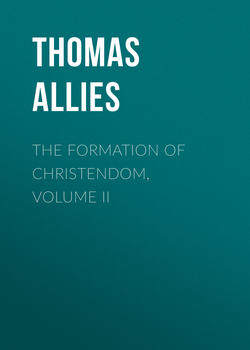The Formation of Christendom, Volume II

Реклама. ООО «ЛитРес», ИНН: 7719571260.
Оглавление
Allies Thomas William. The Formation of Christendom, Volume II
Preface
Chapter VII. The Gods Of The Nations When Christ Appeared
Chapter VIII. The First And The Second Man
Chapter IX. The Second Man Verified In History
Chapter X. The First Age Of The Martyr Church
Chapter XI. The Second Age Of The Martyr Church
Chapter XII. The Third Age Of The Martyr Church
Chapter XIII. The Christian Church And The Greek Philosophy. Part I
Chapter XIV. The Christian Church And The Greek Philosophy. Part II
Отрывок из книги
Under the sceptre of the imperial unity were brought together a hundred different lands occupied by as many different races. That rule of Rome which had grown for many centuries with out, as it seemed, any presiding thought, by the casual accretions of conquest, may be said to assume under the hands of Augustus, about the year of Rome 750, certain definite and deliberately chosen limits, and to be governed by a fixed Idea, more and more developed in the imperial policy. The limits which the most fortunate of Roman emperors, nay the creator of the empire itself, put to it, were the Rhine and Danube, with the Euxine Sea, on the north; the deserts of Africa on the south; the Euphrates on the east; the ocean on the west. The Idea, which may indeed have been conceived by Julius, but was certainly first embodied by Augustus, was to change the constitution of a conquering city, ruled by an aristocratic senate, into a commonwealth governed by one man, the representative of the whole people; and the effect of this change, an effect no doubt unforeseen, at least in its extent, by its framer, was gradually to absorb the manifold races inhabiting these vast regions into the majesty of the Roman law, order, and citizenship. The three centuries which follow Augustus are occupied in working out the drama of this unity. During this time the provinces appear to come out more and more as parts of one whole. Some which at its commencement had only just entered the circle of Roman power and thought, as Gaul, become entirely interpenetrated with the law, language, customs, and civilisation of the sovereign city. Spain was nearly as much, and northern Africa perhaps even more Latinised: in all, local inequalities, and the dissimilarity arising from conflicting races, customs, and languages, are more and more softened down, though never entirely removed; and while throughout this period the great city continues the head, yet the body assumes an ever-increasing importance, until at length its members engage the equal solicitude of that central potentate to whom all equally belong. In the times of so-called Roman liberty, the plunder of lands which received pro-consuls for their annual rulers, served to replenish the fortunes of nobles exhausted by the corruption requisite to gain high office; but if the dominion of one at Rome seemed an evil exchange to a nobility which deemed itself born to enjoy a conquered world, at least it served as a protection to those many millions for whom the equality of law and order, the fair administration of justice, and the undisturbed possession of property, constituted the chief goods of life. Cicero and his peers might grieve over the extinction of what they termed liberty, but Gaul, Spain, Africa, and Asia exulted in deliverance from the oppression of a Verres, a Fonteius, a Gabinius, a Piso, or a Clodius, in the communication of citizenship, and in the peace of a common civilisation.
I. With a passing glance at the progress of this unity, which, great and magnificent as it is, is yet external, let us turn to an object filling the whole of this vast empire with its varied manifestations: for this object leads us to the consideration of another unity, wholly internal, without which that of government, law, and order must be apparent rather than real, or at best, however seemingly imposing, be deprived of the greater part of its efficacy.
.....
A second witness is found in the rites and offices of the very power set up to dethrone and abolish this other power. The Church called upon every one who was received into her bosom to begin by renouncing the usurpation of this great enemy, which was thus declared to be universal. She provided forms for exorcising him. One of her Apostles warned those to whom he wrote that men could not partake at once of the Christian sacrifice and the heathen; for as truly as one was the chalice of the Lord, the other was the chalice of devils; as one was the table of the Lord, the other was the table of devils.37
A third witness is found in the unanimous testimony of all Christian writers as to the reality of the demoniacal powers with which they were waging war; as to their perpetual interference with human life; as to the open and palpable effects which they produced; as to their unwilling retirement in the face of that Stronger One who was come upon them. It was not merely the fervid Tertullian who offered to rest the truth of Christianity and the life of any ordinary Christian upon his power publicly to expel a demon. Athanasius, who weighs every word he utters, says also, “Let him who will, try the truth of what we have said, and in the very presence of the spectral illusion of the demons, of the deceit of oracles and the wonders of magic, let him use the sign of the cross derided by them, only naming the name of Christ, and he shall see how by him the demons fly, the oracles cease, and every sort of magic and witchcraft is annulled.” No less express is S. Augustine in acknowledging the reality of these dark powers, and the wonders worked by them.38
.....